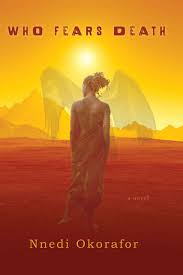 I’ve skimmed through a variety of reviews of Who Fears Death after finishing it myself, specifically negative reviews, because there are a few things I didn’t like about the book that others pointed out as well. The ending was abrupt, anti-climactic, and unfulfilling, and this was mostly because the narrative relied on a self-fulfilling prophecy plot which allowed Okorafor to conclude the story with “spirit world magic stuff” instead of with a logical or thought-provoking conclusion. I also would’ve liked a little more world-building surrounding the magic system in the book, how it works, what it’s limitations are, and what it comes from. Somewhere out there is a lecture by Brandon Sanderson in which he says something along the lines of how a magic system’s limitations, i.e. what it can’t do, are more interesting than what it can do, and that’s always stuck with me. But despite its flaws, I still thoroughly enjoyed Who Fears Death and want to talk about what I loved.
I’ve skimmed through a variety of reviews of Who Fears Death after finishing it myself, specifically negative reviews, because there are a few things I didn’t like about the book that others pointed out as well. The ending was abrupt, anti-climactic, and unfulfilling, and this was mostly because the narrative relied on a self-fulfilling prophecy plot which allowed Okorafor to conclude the story with “spirit world magic stuff” instead of with a logical or thought-provoking conclusion. I also would’ve liked a little more world-building surrounding the magic system in the book, how it works, what it’s limitations are, and what it comes from. Somewhere out there is a lecture by Brandon Sanderson in which he says something along the lines of how a magic system’s limitations, i.e. what it can’t do, are more interesting than what it can do, and that’s always stuck with me. But despite its flaws, I still thoroughly enjoyed Who Fears Death and want to talk about what I loved.
Okorafor has a very blunt writing style that I like. She doesn’t beat around or even build up to anything; she writes authoritatively and suddenly. Time in the story passes quickly as a result of the way she writes. The story will skip forward without any real indication of how much time has passed except for occasional mentions of how old the main characters have become. Her writing highlights only the most important moments and conversations, the defining ones. I don’t mind this, and much prefer it to the opposite (spending too much time on tedious day-to-day things), but it did have the effect of making me feel slightly less attached to the characters. What I loved about Nnedi Okorafor’s writing style is her ability to say so much in a single sentence. Every sentence is somehow loaded with information or context or back story. One chapter opened with this line: “It’s a day I’ve pulled up many times in the last year to remind me life is also good.” I loved the sentence so much I wrote it down because it’s so simple but so effective.
And while the plot of Who Fears Death was flawed, the content throughout the book is incredible. You can imagine how much gender equality comes up as an issue in a book that features a sorceress destined to save the world with a male partner destined to help her in a misogynistic society. Some of my favorite moments in the book are when Onyesonwu and her lover/partner Mwita have to navigate their switched gender roles. Mwita being jealous and Onyesonwu being arrogant or lacking patience and empathy. Another thing I loved about the book is the setting. It’s easy to assume at first, because of the use of magic and sorcery, that the novel is set in Africa in the past, maybe pre-civilization, but it is actually set in post-apocalyptic Africa. Computers are a thing of the past and technology as we know it is only used or even encountered occasionally. I love the idea that magic doesn’t have to be primitive. Magic follows technology in this universe instead of preceding it. Of course race is a huge issue in the novel as well and one of the most interesting points I think Okorafor makes when discussing race in the novel is that so often, people who are marginalized or discriminated against for being different in whatever way, are called upon to do the most for the society that judges or marginalizes them. And related to that is the higher standard marginalized people are often held to and how much pressure that puts on a person in society, at home, and between friends. Overall, I really enjoyed Who Fears Death. I thought it was meaningful, thought-provoking, and relatable, and I’d recommend it despite its flaws.
Links: Nnedi .com | Goodreads | Amazon
